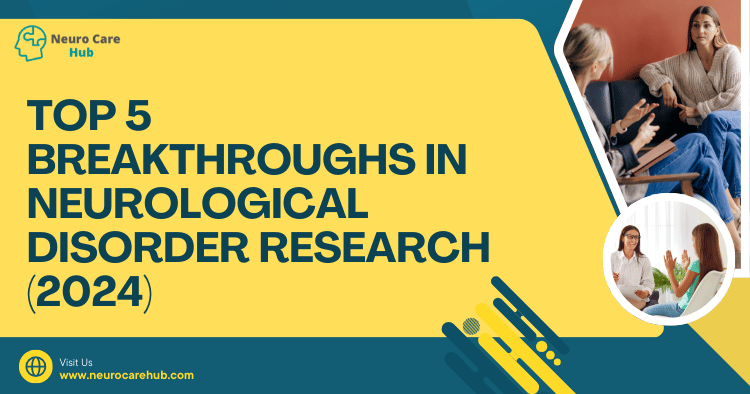Table of Contents
- Introduction
- 1. The Role of AI in Diagnosing Neurological Disorders
- 2. Advances in Gene Therapy for Neurological Conditions
- 3. New Treatment Options for Alzheimer’s Disease
- 4. Innovations in Multiple Sclerosis Management
- 5. Breakthroughs in Epilepsy Research
- Conclusion
- FAQs
—
Introduction
The landscape of neurological disorder research is evolving at an unprecedented rate, bringing hope to millions affected by conditions such as Alzheimer’s, multiple sclerosis (MS), and epilepsy. As we step into 2024, a wave of breakthroughs promises to change the way we understand, diagnose, and treat these debilitating disorders. In this article, we will explore the top five advancements that have emerged, providing insights into their significance and implications for the future.
—
1. The Role of AI in Diagnosing Neurological Disorders
Artificial Intelligence (AI) is revolutionizing the field of medicine, and neurological disorder diagnosis is no exception. Recent advancements have led to the development of AI algorithms that can analyze imaging data, such as MRIs and CT scans, with remarkable accuracy. For instance, a study published in Nature Medicine demonstrated that an AI model could identify signs of multiple sclerosis from brain scans with 95% accuracy—surpassing traditional methods.
Why AI Matters
- Speed: AI can process vast amounts of data quickly, leading to faster diagnoses.
- Precision: Enhanced accuracy reduces the risk of misdiagnosis, which is crucial in conditions like Alzheimer’s, where early intervention is vital.
For more details, check out the Nature Medicine study. This aligns with the insights discussed in our article on Top 5 Methods Neurologists Use to Diagnose Disorders.
—
2. Advances in Gene Therapy for Neurological Conditions
Gene therapy has taken center stage in the treatment of neurological disorders, offering potential cures for conditions that were once deemed untreatable. Recent trials have shown promising results in using gene-editing techniques, such as CRISPR-Cas9, to correct genetic mutations responsible for diseases like Huntington’s and spinal muscular atrophy (SMA).
Key Highlights
- Targeted Approaches: Gene therapy can target the root cause of disorders, potentially reversing symptoms rather than just managing them.
- Clinical Trials: Ongoing clinical trials show significant improvements in patients’ quality of life, marking a new era in neurological treatment.
You can learn more about gene therapy breakthroughs from The National Institutes of Health. For further context, consider our article on Top 5 Reasons Neuro Care is Essential in Modern Medicine.
3. New Treatment Options for Alzheimer’s Disease
Alzheimer’s disease remains one of the most challenging neurological disorders, but 2024 has brought forth promising new treatment options. One of the most notable breakthroughs is the approval of amyloid-targeting therapies, which aim to clear amyloid plaques from the brain—a hallmark of Alzheimer’s.
Recent Developments
- Lecanemab: This monoclonal antibody has shown to slow cognitive decline in early-stage Alzheimer’s patients by 27% compared to placebo.
- Combination Therapies: Researchers are exploring the efficacy of combining amyloid-targeting drugs with anti-inflammatory agents, which may enhance overall treatment effectiveness.
For a deeper dive into Alzheimer’s research, visit Alzheimer’s Association. This connects with our insights on Top 5 Essential Insights on Neuro Care You Need to Know.
4. Innovations in Multiple Sclerosis Management
Multiple sclerosis (MS) affects millions worldwide, but 2024 has brought significant innovations in its management. New oral medications, such as ozanimod, have emerged, providing patients with effective alternatives to traditional injectables.
Innovations Include:
- Improved Accessibility: Oral treatments are often more convenient, leading to better patient adherence.
- Personalized Medicine: Advances in pharmacogenomics allow for tailored treatment plans based on individual genetic profiles, enhancing efficacy and reducing side effects.
You can explore more about MS treatments at the National Multiple Sclerosis Society. This topic is further elaborated in our article on Top 5 Benefits of Early Intervention in Neuro Care.
5. Breakthroughs in Epilepsy Research
Epilepsy research has seen exciting developments, particularly in the realm of new anti-epileptic drugs (AEDs) and non-pharmacological treatments. The introduction of therapies like cannabidiol (CBD) has proven effective for treatment-resistant epilepsy.
Noteworthy Findings:
- Efficacy of CBD: Studies have shown that CBD can reduce seizure frequency significantly, paving the way for its broader use in clinical settings.
- Neurostimulation Devices: New devices that stimulate the vagus nerve are also offering alternative treatment avenues for those who do not respond to medication.
For additional insights, check out the Epilepsy Foundation. This aligns with our discussion on Top 5 Common Neurological Disorders Explained.
Conclusion
The advancements in neurological disorder research in 2024 illuminate a brighter future for countless individuals facing these challenges. From AI-driven diagnostics to groundbreaking treatments, the commitment to innovating and improving patient outcomes remains a priority. As research continues to evolve, we can only hope for further breakthroughs that will enhance the lives of those affected by neurological disorders.
FAQs
Q: What are neurological disorders?
A: Neurological disorders are conditions that affect the brain, spinal cord, and nerves, leading to a range of symptoms that can impact movement, communication, and cognitive function.
Q: How can I support neurological research?
A: You can support neurological research by donating to reputable organizations, participating in clinical trials, or spreading awareness about neurological disorders.
Q: Are there lifestyle changes that can help with neurological disorders?
A: Yes, lifestyle changes such as a balanced diet, regular exercise, and stress management can positively impact neurological health. For tips on lifestyle changes, refer to Top 5 Lifestyle Changes for Better Neuro Health.
Q: Where can I find reliable information about neurological disorders?
A: For accurate information, visit websites like Mayo Clinic or WebMD.
With these advancements, we look forward to a future where neurological disorders are better understood and more effectively treated. Stay informed and engaged with ongoing research and developments in this vital field!






